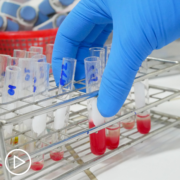How Do Myeloma Test Results Influence Prognosis and Care?
How Do Myeloma Test Results Influence Prognosis and Care? from Patient Empowerment Network on Vimeo.
Key testing is important for understanding myeloma, but how do results impact care and treatment? Myeloma experts Drs. Ashley Rosko and Francesco Cottini discuss how test results can affect care options and encourage patients to discuss results with their healthcare team.
Related Programs:

|

|

Making Treatment Decisions | Understanding Common Myeloma Therapies |
Transcript:
Katherine:
Dr. Rosko, what do the results of these tests tell you about prognosis?
Dr. Rosko:
Yeah, I think this is a really important question. And, in my experience, when we encounter a patient newly diagnosed with myeloma, it is like drinking from a firehose in terms of the amount of information that we are reviewing and the amount of information that we are discussing with the patient and with their family. And oftentimes, we talk about this piece of these cytogenetic abnormalities, and we talk about – but I really encourage your patients and anyone who is listening in today to really take a deeper dive.
Because sometimes it’s helpful as, one, you’re navigating a new cancer diagnosis, but that’s challenging in and of itself. And then, two, talking about a cancer, multiple myeloma, that is – most people don’t know so much about multiple myeloma, unlike breast or colon or lung cancer, and so I really encourage patients and their caregivers. And a lot of times this happens, where we’ll go over all the cytogenetic abnormalities, we’ll talk about how it plays a role in their overall treatment trajectory, and their prognosis, but also good just to circle back and say.
Settling into what this diagnosis is, oftentimes, people on first time treatment. And then even sometimes months or even years into their diagnosis, they stop and they come back and they say, “Can we talk about this FISH data?
Can we talk about what changes that I had within the DNA? What does this mean?” And that’s not uncommon at all.
So, I really feel like for many people that are on the call here today, I think it’s important to say it’s okay to go back to your physician and say, “I’m learning more about this, now that I’m more familiar with what this diagnosis is, can we talk about these FISH changes, or can we talk about the stage of my cancer?” Because I think it’s oftentimes an overwhelming period of time to have a new cancer diagnosis. And I also want to just give permission to everyone on the call that it’s okay to go back and ask questions, even if it’s been months or years.
So, having high-risk mutation can upstage a cancer and in the absence of high-risk mutations can downstage a cancer. So, what that really means is saying, “These biologic changes that are happening in the cancer cells give a sense of what we anticipate that the trajectory is going to be when someone is diagnosed.”
Now, it’s imperfect. I feel like cancer just generally is unpredictable, and there are many things that we try as clinicians. And especially with the experience that we have, to say, “This is what we anticipate the course will be like you, in terms of response, in terms of the cancer being quiet.” As you all know, multiple myeloma is not a curable cancer right now. And for all patients, when they’re diagnosed, they’re often able to get disease control and be able for that cancer to be put in remission. And we do focus on remission.
I think that’s also something that I talk to my patients about. Even though we can’t cure it, we can certainly control it, and that’s a big part of what we do. So, when we get good disease control, we’ll talk more about next therapies, but that is how Dr. Cottini – Dr. Cottini is a wonderful scientific investigator and knows all of the latest and greatest when it comes to different mutations that are identified within cancer cells. We partner very closely with her in terms of scientific investigation and how the mutations that were newly identified, too, play a role in terms of response to treatment, and how we’re able to best treat them.
Katherine:
Thank you for that. Dr. Cottini, do you have anything to add as far as what type of questions patients should ask their healthcare team about test results?
Dr. Cottini:
I mean, I think Dr. Rosko already pointed out the most important things. So, multiple myeloma is a rare disease, and it’s not as intuitive to understand as breast cancer, lung cancer, prostate cancer.
So, it’s really important as a patient to understand which tests are we ordering. Why are we ordering? How do we monitor the disease? Because that’s one of the most important questions the patient asks, because for different types of solid tumor, we get imaging, and we know that the tumor is growing or not. Where, for us, we look at the markers I had described previously. And sometimes, we maybe see small changes in the markers that are very concerning and worrisome for the patient, but sometimes they are not. So, I think asking questions about the testing and how we treat them and monitor the disease is a very important part of being a good applique for itself.






